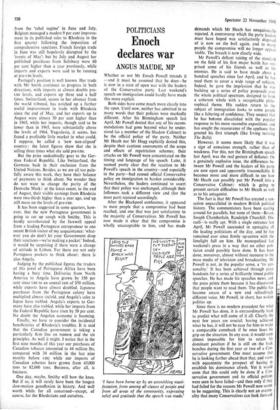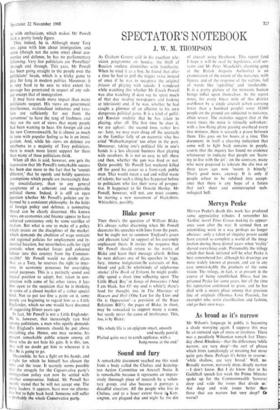Enoch declares war
POLITICIANS ANGUS MAUDE, MP
Whether or not Mr Enoch Powell intends it —and it must be assumed that he does—he is now in a state of open war with the leaders of the Conservative party. Last weekend's speech on immigration could hardly have made this more explicit.
Both sides have come much more clearly into the open. Until now, neither has admitted in so many words that their policies were markedly different. After his Birmingham speech last April, Mr Powell denied that any of his recom- mendations had gone beyond what he under- stood (as a member of the Shadow Cabinet) to be the official policy of the party. Neither Mr Heath nor Mr Hogg explicitly denied this, despite their cautious assessments of the scope and effects of repatriation schemes; their attacks on Mr Powell were concentrated on the timing and language of his speech. Later, it seemed pretty clear that the reaction to Mr Powell's speech in the country—and especially in the party—had caused official Conservative policy on immigration to harden considerably. Nevertheless, the leaders continued to assert that their policy was unchanged, although their followers took a different view and (for the most part) rejoiced accordingly.
After the Blackpool conference, it appeared to most people that a compromise had been reached, and one that was just satisfactory to the majority of Conservatives. Mr Powell has now made it clear that the compromise is wholly unacceptable to him, and has made 'I have been borne up by an astonishing mani- festation, from among all classes of people and from all areas of the community, expressing relief and gratitude that the speech was made.'
demands which Mr Heath has unequivocally rejected. A controversy which the party leaders
must have hoped was satisfactorily disposed of is now on the boil again, and to many people the compromise will no longer appear viable. The breach is now clearly wide.
Mr Powell's defiant raising of the standard on the field of his first major battle has sur- prised some of his friends as well as his enemies. He is said to have made about a hundred speeches since last April, and he has used them to cover a wide range of subjects. Indeed, he gave the impfession that he was building up a series of policy proposals over
the whole political spectrum, designed to form a coherent whole with a recognisable philo-
sophical theme. His sudden return to the subject of immigration looks to some people like a faltering of confidence. They suspect that he has become dissatisfied with the popular response to his more recondite expositions, and has sought the reassurance of the applause that greeted his first triumph (like Irving reviving The Bells).
However, it seems more likely that it was a sign of conscious strength, rather than of weakness. For this, not the Birmingham speech last April, was the real gesture of defiance. On a genuinely explosive issue, the differences be- tween Mr Powell and the leaders of his party are now open and apparently irreconcilable. It becomes more and more difficult to see how Mr Heath can possibly put Mr Powell into a Conservative Cabinet : which is going to present certain difficulties to Mr Heath as well as to his antagonist.
The fact is that Mr Powell has created a sen- sation unparalleled in modern British political history. The commentators have been casting around for parallels, but none of them—Bevan, Joseph Chamberlain, Randolph Churchill, Dis- raeli—is really apt. With, a single entrance last April, Mr Powell succeeded in upstaging all the leading politicians of the day, and he has remained ever since firmly up-centre with the limelight full on him. He monopolised last weekend's press in a way that no other poli- tician could possibly have done. It has been done, moreover, almost without recourse to the mass media of television and broadcasting. Mr
Powell is not, in the popular sense, a 'TV per-
sonality.' It has been achieved through press handouts for a series of brilliantly timed public speeches. He has made his speeches news, and the press prints them because it has discovered that people want to read them. The public has become aware of a new and refreshingly different voice. Mr Powell, in short, has woken politics up. Since there is no modern precedent for what Mr Powell has done, it is extraordinarily hard
to predict what will come of it all. Clearly the next few years are crucial; having achieved what he has, it will not be easy for him to make a comparable comeback if he once loses his grip on the situation. In any case, it would seem almost impossible for him to retain his dominant position if he is still on the back benches during the first year or two of a Con- servative government. One must assume that he is looking farther ahead than that, and views with equanimity the prospect of having to establish his dominance afresh. Yet it would seem that this could only be done if a Con- servative government and its official policies were seen to have failed—and then only if they had failed for the reasons Mr Powell now seems to be suggesting. This is clearly not an eventu- ality that many Conservatives can look forward
to with enthusiasm, which makes Mr Powell look a pretty lonely figure.
This, indeed, he is. Although many Tory tiles agree with him about immigration, and
some (though not the same ones) about eco- nomics and defence, he has no parliamentary following. Very few politicians are 'Powellites' through and through. This year, Mr Powell has been going straight to the people over the politicians' heads, which is a tricky game to play for long in modern politics. Moreover, it is very hard to be sure to what extent his message has penetrated in respect of any sub- ject except that of immigration.
It may have made more impact than many politicians suspect. His views on government
interference, nationalised industries and taxa-
tion are sufficiently far out from the `consensus' to have the tang of freshness, and they are the sort of views that many people
had been wanting to hear. On foreign aid and the new Commonwealth, he is almost as much in tune with popular feeling as he is on immi- gration. And, while his views on defence are anathema to a majority of Tory politicians, there is much more latent support for them than many of these politicians think.
When all this is said, however, one gets the impression that Mr Powell's remarkable success
has been due more to the fact that he 'sounds
different,' that he openly and boldly questions assumptions which people are increasingly find- ing unsatisfactory, than to any general
acceptance of a coherent and recognisable political theme. Indeed, it is still an open question whether Mr Powell's policies are in- formed by a consistent philosophy. In the fields of foreign policy and defence, a connecting thread can be clearly discerned. His known views on economics and finance appear to have achieved consistency only by some sacrifice of realism. But what is one to make of a policy which insists on the disciplines of the market, which demands the abolition of wage restraint
and regional policies for employment and in- dustrial location, but nevertheless calls for rigid controls when market forces pull coloured labour into this country from the Common-
wealth? Mr Powell would no doubt claim that, as a Tory, he reserves the right to inter- vene in economic processes for overriding
social purposes. This is a perfectly sound and logical position to adopt; but, taken in con- junction with some of his other views, it lays
him open to the suspicion that he is thinking in terms of a closed market of a rather special kind. Not to put too fine a point on it, some people are beginning to regard him as a Little Englander, which no one would have dreamed of suggesting fifteen years ago.
In fact, Mr Powell is not a Little Englander. He is, however, that increasingly rare bird among politicians, a man who openly demands that England's interests should. be put above everything else. Hence, one may surmise, his present remarkable public esteem among all those who do not hate his guts. It is this, too, that will no doubt get him to wherever it is that tie is going to go.
Meanwhile. he has a fight on his hands, and a tight for which he himself has chosen the time and the issue. It scarcely seems possible that the struggle for the Copservative party's immigration policy can now be settled with another compromise. Indeed, Mr Powell has openly stated that he will not accept one. The party leaders. it appears. have now no alterna- tive but to-fight back hard. Someone will suffer —probably the whole Conservative party.



































 Previous page
Previous page